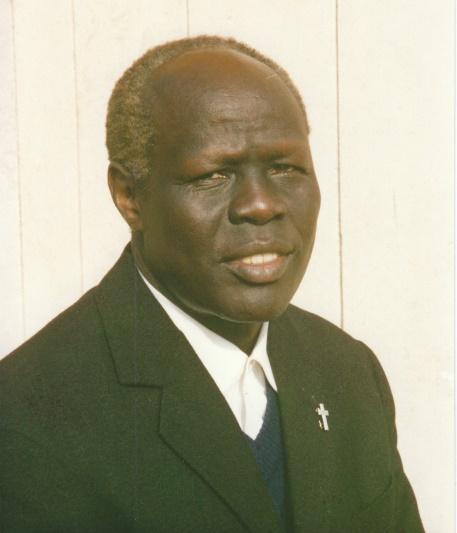Daniel Comboni
Comboni Missionaries
Institutional area
Other links
Newsletter
In Pace Christi
Ayon Hector Oyiamute
Fr. Oyamute, a Sudanese of the Didinga tribe, son of Oyiamute and Maria Ito, was born in 1944 in the village of Chukudum, in Eastern Equatoria. In 1954 he entered the seminary of Okaru, and, in 1960, moved to that of Tore River. In 1963 he went to Italy and joined the Comboni novitiate in Florence after which he went on to Venegono. He took first vows on 9 September, 1967 and perpetual vows two years later. He was ordained priest by Paul VI on 17 May, 1970.
Immediately after his ordination he was sent to Uganda where he worked for two years in the diocese of Moroto among the Sudanese refugees fleeing the guerrilla warfare in South Sudan. There was a refugee camp at Nakapiripirit (in the mission area of Amudat and Namalu), run by the UNHCR. In that area there were also several Comboni Missionaries who had previously worked in South Sudan and had moved to Karamoja for the pastoral care of the refugees.
In 1972, Fr. Oyamute was transferred to South Sudan where he worked in the parish of Chukudum, among the people of his own tribe. In 1986 he became assistant to Fr. Ottorino Filippo Sina at the quasi-parish of Munuki, Juba. In 1989-1990, he did a sabbatical year in Rome. After a year at Sololo, in Kenya, he worked until 1996 at Loa, Palokota (among the refugees), at Agang-Rial and in Nairobi (again among the refugees). He spent the year 2004-2005 in Rome at the Centre for Ongoing Formation with the priest-students. He returned to Sudan and worked at Juba, Yirol and at the pre-postulancy of Moroyok until the time of his death. Fr. Oyamute died in Juba at the age of 71 years, after a long illness.
Fr. Luis T. Okot Ochermoi, who knew Fr. Oyamute at the parish of St. Kizito, Juba, first as a Comboni aspirant, during his pastoral experience during his postulancy, later as a scholastic and, finally, during the last year of his life, describes their relationship as enriching and enlightening for the human and spiritual joys it brought him and for the sharing that took place between the elderly Comboni Missionary and his younger confrere. He describes Fr. Oyamute as a person who was kind, humble, and charitable and a man of prayer. “The news of his death reached me on 28 June, 2015. On the following morning, having celebrated Holy Mass with Mgr. Paulino Lukudu Loro, we set out for his native village of Chukudum, where he was buried.
Fr. Giuseppe Pellerino recalls: “I was always struck by his humble, friendly and calm disposition, truly fraternal, and by his availability: he used to encourage and give good advice to all and be available for hearing the confessions both of the laity and of the confreres. He was somewhat optimistic in evaluating questions and difficult situations; his attitude was mostly positive and open-minded in discerning crucial problems and critical moments, even when others might well have taken a more negative position”.
From the testimony of Fr. Salvatore Pacifico: “Fr. Hector went through a long period of illness that must have caused him much suffering. But I often thought of his interior sufferings: he must have suffered greatly due to his situation. At times I was told he was rather demanding and stubborn but I never found him like that. Instead, I found him very sensitive and appreciative. I was really moved by his sensitivity when he expressed his appreciation for the services rendered to him by the confreres. Judging by the way he related to the people, I imagine he must have been a very sociable person, ready to mix with everyone. Everywhere he went, he made many true and lasting friends”.
Da Mccj Bulletin n. 266 suppl. In Memoriam, gennaio 2016, pp. 64-67.

